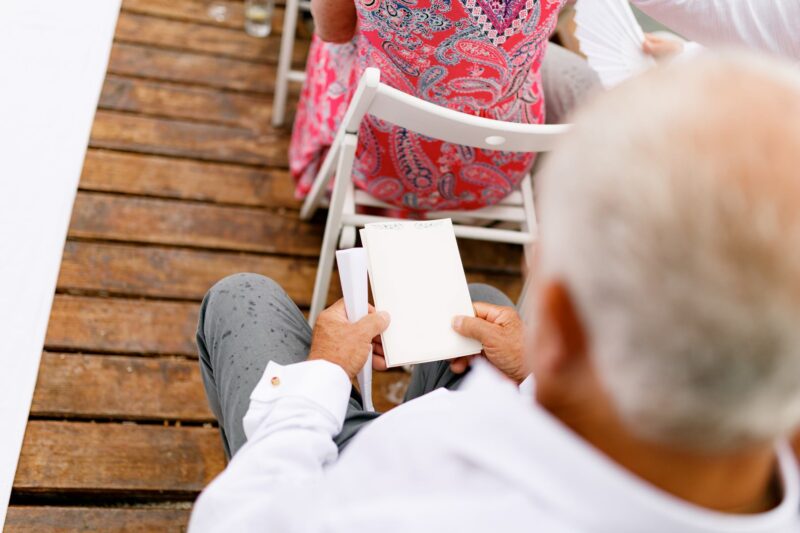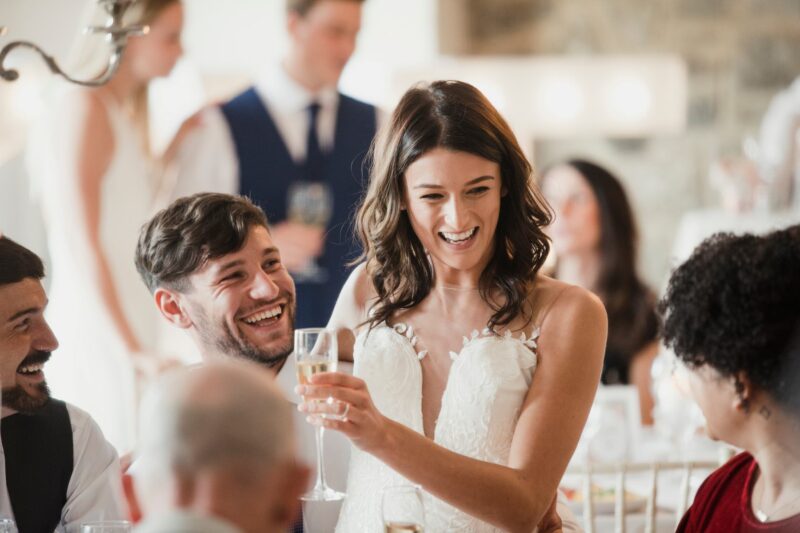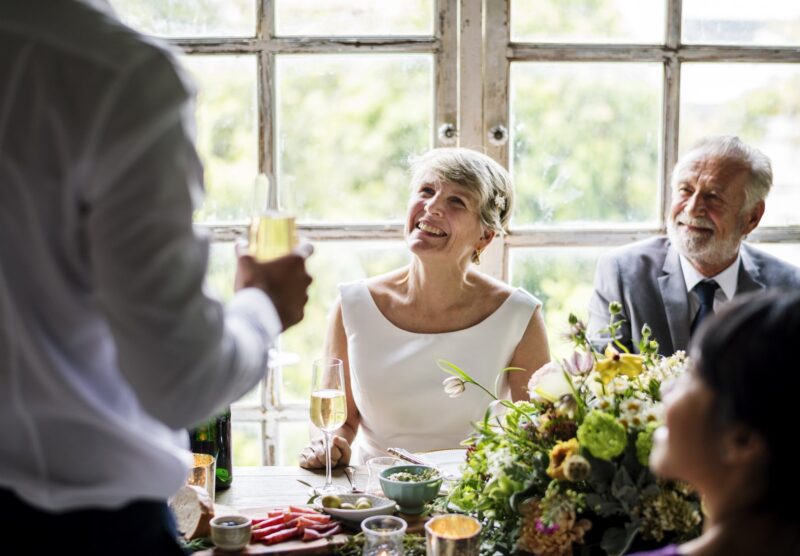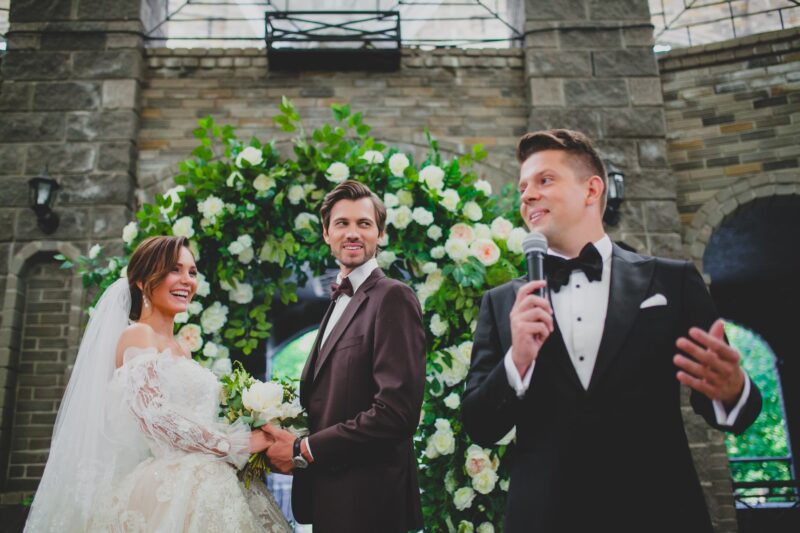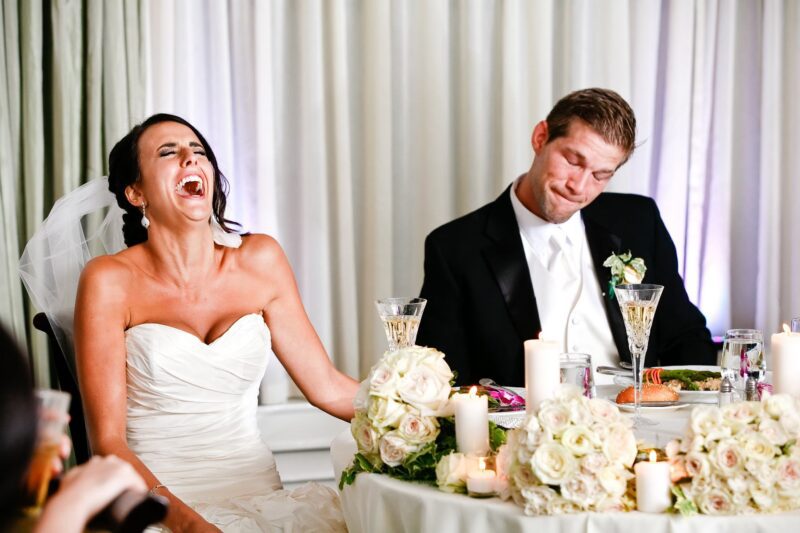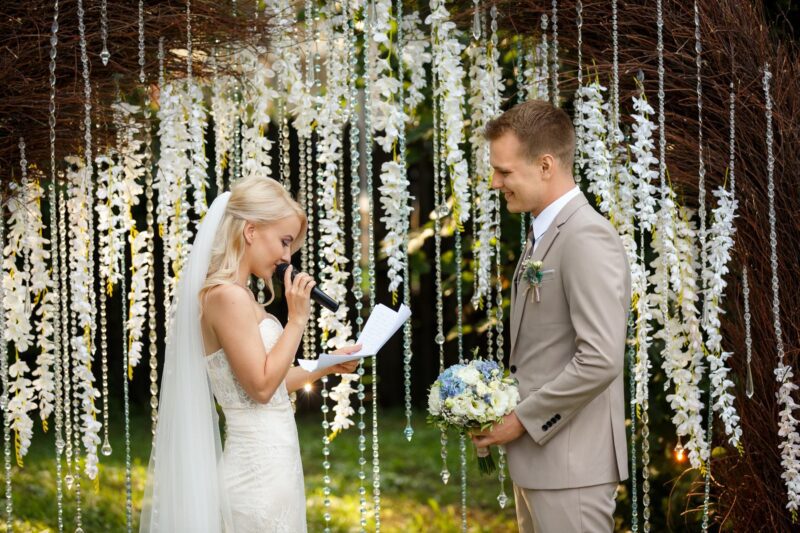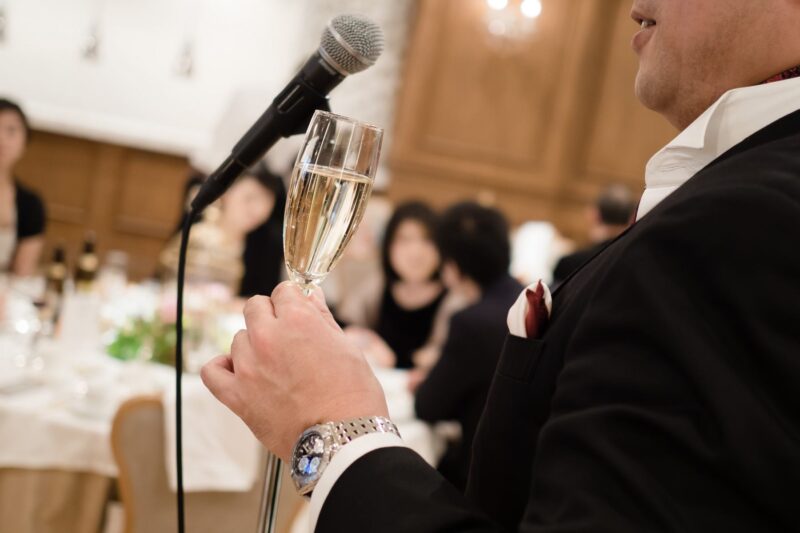Wedding Speech Delivery

Handling Nerves & Anxiousness
Nervous, anxious…? Use them to your advantage…!
Once you know you have to speak in public, your body can react in a number of ways from:
- Feeling a sense of impending danger, panic or doom
- Your heart rate increasing
- Increased breathing
- Sweating
- Trembling
- Feeling weak
- Feeling tired
- Feeling restless and tense
- Feeling nervous
- Feeling anxious
It is all very good and well for me or anybody like me to help you address the above; however, at the end of the day, some or all of the above will effect / happen to you before and during your speech no matter how much training, support and guidance that you receive. The trick is to accept them as normal and use them to your advantage i.e., they make you excited. Key to doing this is practicing, practicing and practicing your speech over and over again with somebody who is able and qualified to give you constructive feedback.
These steps will help too:
- Know your speech very well
- know the room that you will be speaking in
- What are you worried about and address it
- Picture yourself delivering a great speech
- Don’t forget to control your breathing before and during your delivery
- Don’t be afraid of silence
- Look at the audience
- Enjoy the honour and the experience
- Tears – if you feel that you could get emotional, or you feel getting emotional during your speech or beginning to choke up, have a glass of water beside you, stop and take a sip from it, raise your voice and fight through the emotion; try not to stop talking or sit down
Using Notes
Stick to the script...
For most wedding speech speakers, it is probably only your first or second time speaking in front of your family, relations, friends i.e., people who know you, the real you. Therefore, it is important to be authentic. To help you to be authentic on the day of your wedding speech, every word that you are going to say should be in front of you, in large font, on paper. Why spend the time and effort trying to memorize your speech. Yes, practicing its delivery is paramount and with your notes! However, trying to memorise it on the day with 200-300 people looking at you, could be a recipe for a show-stopper, literally.
Use your wedding speech notes as follows:
- Type and print all of your speech on paper and paper-clip it together
- Use a font size that you can see the speech without any effort when it is placed flat on the table in front of you, while you are standing
- Only use one side of the page
- Have your speech structured into the different people / sections that you wish to talk about
- Don't let a sentence run into a second a page
- Start a new sentence on a new page
- Number the pages in the middle of the Header
- Remove the paper clip and have the pages loose on the table
- When turning the pages, turn the page over so that its blank side is facing you
- Don’t be concerned about people to your left and right of you seeing your speech
- Try to avoid having any handwritten notes on your typed speech
- Stick to the script, adding nothing to the speech or taking nothing from the speech
Speaking With Clarity
Say every letter in every word...
It would be a travesty, that after all your effort in developing, structuring and writing your wedding speech, that on the day of the wedding, no one can understand what you are saying or what you said; because you spoke too quickly, spoke too lowly or you didn’t hold the microphone correctly. Nothing is as frustrating for an audience than to watch and listen to a wedding speaker that they cannot hear and understand for whatever reason. The audience are interested in what you are saying; however, to make them more interested in what you are saying, it is how you are saying your speech content / words / phrases is what matters most to them, and is what will make the audience enjoy and remember it, and give you plaudits afterwards.
Deliver your wedding speech with clarity by:
- Controlling your speech delivery pace by focusing on saying every letter in every word
- Starting your speech delivery the way you mean to continue it, right to the very end
- Pausing after comma’s, full-stop’s and at the end of paragraphs
- Raising the voice
- Inflecting on key words
- Being and remaining authentic
- Speaking from the heart
- Breathing
- Smiling
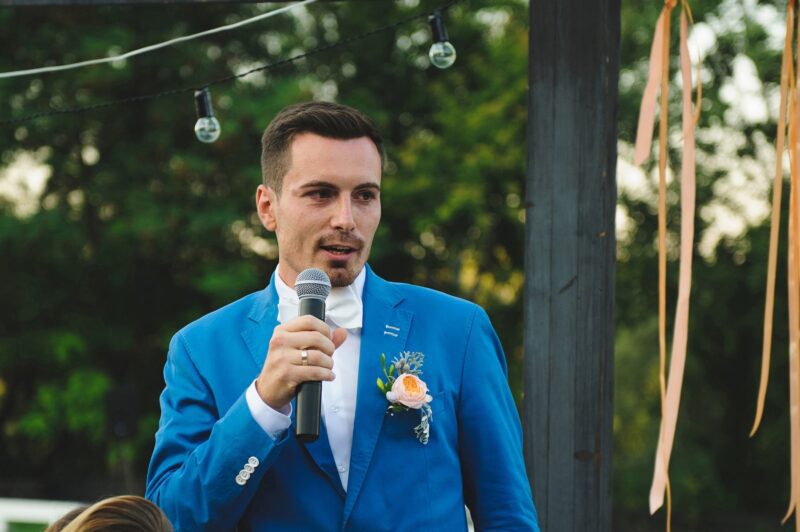
Using a Microphone
Use it properly...
Most weddings involve large numbers of invited guests. Any more than 50 invited guests, requires you as a speaker to use a microphone. It gives you a sense of importance, authority and control and allows people to easily hear you (obviously!). Try to use and test the microphone before your speech delivery in the actual room that you will be speaking in is always a good thing to do, and gives you more confidence, in that you will have now delivered your speech in the actual room using the actual microphone. Know how to turn the microphone on and off and where to position it in relation to your hand-to-mouth.
Do this when holding a microphone:
- Try to use a ‘roaming’ microphone
- Hold it in your ‘writing’ hand
- Hold it with your right hand under the element / capsule
- Keep it upright
- Position the top of the microphone at the front of your chin
- Ensure that it is touching your chin (this will ensure that as you look up, look down, look left, look right, the sound of your voice will be constant and consistent)
- Lock the arm holding the microphone into your chest, so that it is now part of your whole body
Pleasing / Engaging With Your Audience
Look ‘em in the eye...
A wedding is all about two people i.e., the Bride and the Groom, everything is all around them on the day of their wedding. So, your speech content and delivery is about them and delivered to them respectively and the audience are just by-standers. As you deliver your speech, your primary focus is on the Bride and Groom with a ‘sometimes’ eye contact towards the audience. I appreciate that you are conscious of the audience being your main starer's; however, you are there in that speaking capacity (and indeed as a guest too) because of the Bride and Groom. Your audience is the Bride and Groom!
To please / engage with your audience:
- Make sure your speech content does not upset anybody in any way (if in doubt, leave it out!)
- Speak from the heart
- Speak into the microphone
- Be articulate and clear
- Allow the audience laugh, cry, applaud you by pausing
- Smile
Wedding Speech Writing
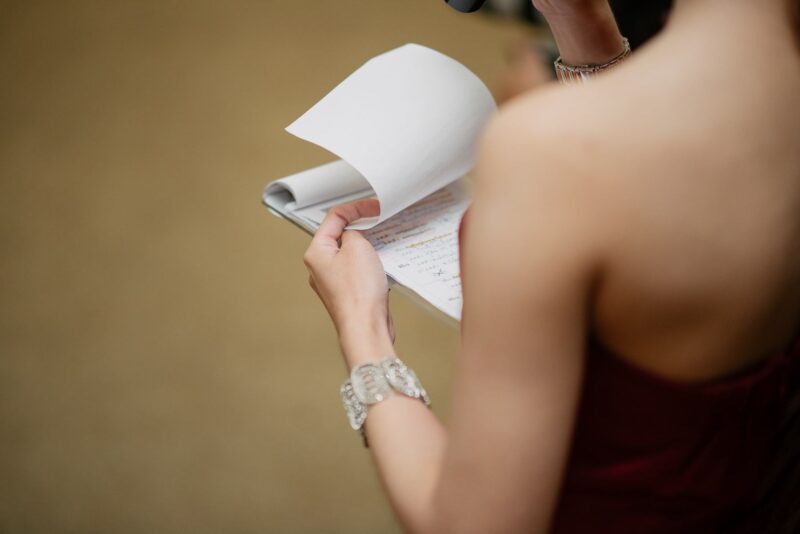
Content / Structure
Start early...
When it comes to developing and writing wedding speeches, start early, they can and will eat up time and could (should) take weeks to get it perfected. Wedding speeches do not follow a strict format or structure like work / business presentations i.e., a start, middle and end. However, they do need to cover everybody and everything connected to the wedding; especially the former, because if someone at the wedding who carried out a role or a task (no matter how small and not reimbursed or paid for their product / service) or someone has been a support to the Bride, Groom or their families, is not mentioned or thanked / it could cause upset and disappointment. Primary responsibility to ensure that this does not happen lies with the Bride, Groom, Father of the Bride and Bestman, who really should meet collectively before the wedding to discuss that everybody and everything that needs mentioning is done in their respective speeches (relevantly and only said once, if they are at the wedding!).
Below is a list of roles / tasks (in no particular order) that if part of the wedding, need to be mentioned:
- Church
- Priest(s)
- Altar Boy / Alter Girl / Acolytes
- Sacristan
- Humanist(s)
- Wedding ceremony music
- Wedding ceremony singers
- Family members
- Relations
- Neighbours
- Friends
- Work colleagues
- Grandparents
- Deceased
- Invited guests who could not make the wedding
- Ushers
- Car-ribboner's
- Drivers
- Photographers
- Videographers
- Hotel
- Hotel Wedding Coordinator
- Groomsma(e)n
- Man of Honour
- Maid of Honour
- Matron of Honour
- Chief Bridesmaid
- Bridesmaid(s)
- Flowergirl(s)
- Pageboy(s)
Stories
‘…It’s the way you tell ‘em…’
Stories / memories of the Bride & Groom growing up, in their teenage years and adult years can be shared with the audience, as long as they do not upset, hurt, offend anybody, especially the Bride, Groom and any member of their families. They are used to add humour and fun to a Wedding Speech and should be told as they actually happened / occurred, with some exaggeration allowed and some form of punchline / message / moral at the end. They can be shared around the middle of Wedding Speeches, where 2-3 stories per speech is ample enough.
Stories can be told by the following Wedding Speakers:
- Father of the Bride
- Mother of the Bride
- Father of the Groom
- Mother of the Groom
- Bestman
Stories should not be told by the following Wedding Speakers:
- Bride
- Groom
Stories need to be developed, rehearsed and practiced (and approved!) before your Wedding Speech as they are better told without using / looking at notes i.e., the audience think that you telling the story off-the-cuff.
Humour
‘…Am I naturally funny…?’
Every wedding speaker thinks they have to be funny, putting huge pressure on themselves to try to be funny, as they write and deliver their wedding speech. Telling jokes, telling funny stories that you are not known to normally do / not used to when in the company of their family and friends, is not the real you. However, if you are known to be naturally funny or you believe yourself to be naturally funny or you want to be funny; then, do develop stories / jokes that are appropriate and are about the Bride & Groom, where people laugh with you, rather than at you. Error on telling stories, rather than jokes; as stories well developed, rehearsed and practiced with a punchline at the end can be more interesting to a wedding audience. You will be surprised at what people will laugh at, at a wedding; they are being ‘wined and dined’, in the company of family and friends and in celebratory mood, all great ingredients for fun and laughter (‘Win the crowd, win your freedom’ – Gladiator {2000}). However, at the end of the day, the audience want to see and hear the real you; so be authentic, the best and only way to be when public speaking.
- Introduce humour through well-crafted, appropriate and practiced stories
- Choose funny, yet real stories
- Take the audience on a journey with you, as if they are watching it unfold, in minute detail using personification
Poems
‘…I wandered lonely as a cloud…’
Wedding Speeches are enhanced by the inclusion of a poem, normally at the end of the speech; however, people have written and delivered their complete wedding speech in the form of a poem from start to finish with everything rhyming, all original material and relevant to the Bride & Groom.
When searching for poems to include in your speech, think about poems you learned at school, think about the great poets of the country you were born / live in now and make sure that it is fitting and right for the occasion.
Writing your complete speech in the form of a poem is personal to you and only you can do this. Same guidelines apply as if you were writing a non-rhyming speech.
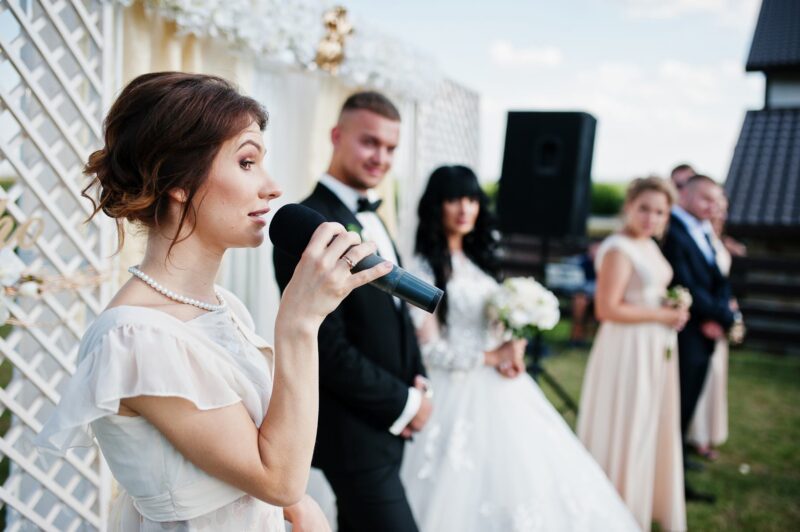
Quotes
‘…To quote or not to quote…’
Wedding Speeches can be enhanced by the inclusion of a quote, normally at the end of the speech, where it encompasses and is relevant to the Bride & Groom and their wedding day. They can also be shared during the speech too.
When searching for quotes to include in your speech, think about quotes you learned at school, read or heard somewhere from radio, tv, print media making sure that it is fitting and right for the occasion.
It is professional and expected that you reference the quote(s) i.e., who said it, when and where if possible.
When delivering your quote, your speaking pace should be cut by 50% and said from the heart.
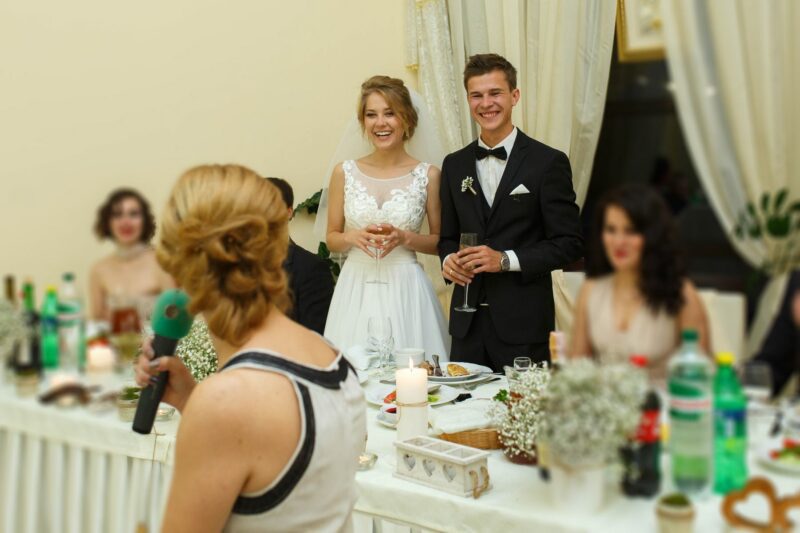
Thank you’s
‘…I’d also like to thank…’
You might think that ‘Thank you’s’ at your wedding can be monotonous and boring for your audience; however, if there are people at the wedding who have carried out a role, a task or done you a favour, then they need to be thanked and thanked sincerely. You should not really thank people who are in the audience who have carried out a paid service for you i.e., Hairstylist, Photographer, Videographer; though having said that, if they have carried / are carrying out a great job for you or they are a family member, relation or friend, then they should be mentioned.
Once you start thanking people, you must ensure that you thank everyone who needs to be thanked or are expecting a ‘Thank you’. Thanking some people and not others will be a mistake and you will forever be reminded of it. You have one chance here, so sit down and meticulously list down who I need to / should be thanked.
The ‘Thank you’ duty is mainly the role of the Groom; yes, other wedding speakers do thank people too, however the ‘big’ i.e., important ‘Thank you’s’, should come from the Groom on behalf of themselves and their Bride. The four main wedding speakers at the wedding, namely The Groom, Father/Mother of the Bride, Father/Mother of the Groom and Bestman could meet informally and discuss / agree who is thanking who, as hearing people get thanked more than once (never mind just once) does not sound good, looks a bit dis-organised and could lose the audience.
Know where the person that you are thanking is in the audience and as you thank them, look at them, make sincere eye contact and thank them sincerely.
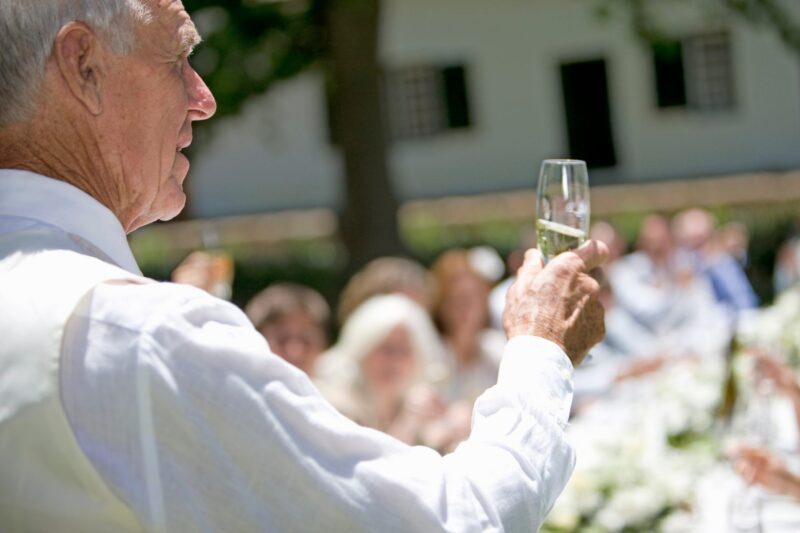
Toasts
‘…Please join me in a toast to…’
There are generally two Toasts at a wedding:
- A Toast to The Bride & Groom toasted by The Bestman
- A Toast to The Bridesmaid toasted by The Groom
You may have seen and heard Fathers/Mothers of the Bride, Fathers/Mothers of the Groom toasting the Bride and Groom, the Bestman toasting the Bridesmaids (and Groomsmen) and / or wedding speakers toasting the deceased which is fine; however, it is not protocol at a wedding.
When toasting, your words are as follows:
- For The Groom:
- ‘…Can you all please be upstanding and join me in a toast to ‘Bridesmaid’s first names’, The Bridesmaids…’
- For The Bestman:
- ‘…Can you all please be upstanding and join me in a toast to ‘Bride’s first name’ and ‘Groom’s first name’, The Bride & Groom…’
Advice
‘…Let me give you a piece of advice…’
Wedding Speeches can be enhanced by the inclusion of a piece of advice, normally at the end of the speech, specifically for the Bride & Groom.
When searching for pieces of advice to include in your speech, think about advices that have been given to you over the years or that you heard give or read about in print media, making sure that it is fitting and right for the occasion.
Pieces of advice can be funny or serious (though the latter is probably better), don’t have to be too long and should preferably cover both the Bride & Groom. They don’t have to be referenced and should be original i.e., not many people would have heard it before.
When delivering your piece of advice, your speaking pace should be cut by 50% and said from the heart.

